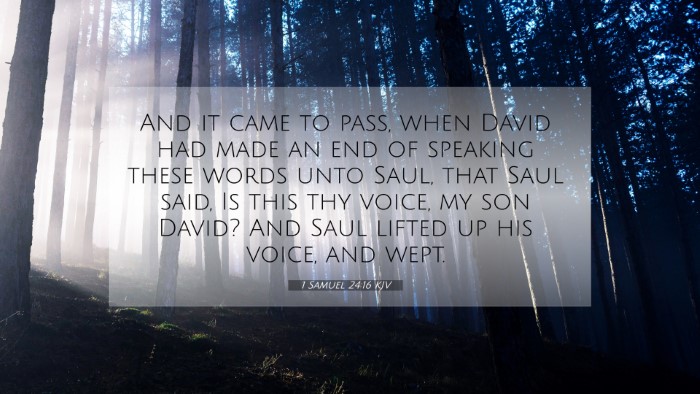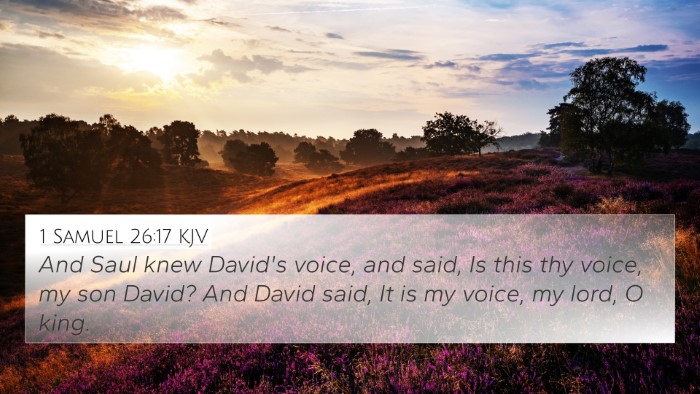Understanding 1 Samuel 24:16
Verse: 1 Samuel 24:16
"And it came to pass, when David had made an end of speaking these words unto Saul, that Saul said, Is this thy voice, my son David? And Saul lifted up his voice, and wept."
Context and Background
This verse is situated in a significant moment during the conflict between David and King Saul. David, having spared Saul's life in a moment of opportunity, addresses Saul, appealing to his conscience and royal dignity. This encounter is pivotal, illustrating themes of mercy, repentance, and the complex relationship between David and Saul.
Verse Meaning Summary
This verse highlights a critical response from Saul after David's plea. The emotional weight of Saul acknowledging David's voice suggests deep feelings of regret and recognition of David's loyalty. The act of weeping portrays Saul's vulnerability and the inner turmoil he experiences due to jealousy and the fear of losing his kingdom.
Commentary Insights
-
Matthew Henry:
Henry emphasizes the tragic downfall of Saul, who, despite his position, is overcome by emotions that reveal his internal conflict. David’s respectful treatment of Saul showcases David's character and reinforces the notion of divine ordination, as he remains obedient despite being wronged.
-
Albert Barnes:
Barnes notes the significance of Saul's response. The king's recognition of David’s voice is not merely a physical acknowledgment but symbolizes a spiritual realization of his failures. Saul's weeping signifies a moment of clarity, where he confronts the depth of his mistakes and the righteousness of David.
-
Adam Clarke:
Clarke reflects on the poignant interaction between David and Saul, suggesting that it reflects the tension of their relationship. His interpretation focuses on the emotional and psychological aspects of Saul, who is portrayed as a man tormented by fear and envy, leading him to cry in recognition of David's loyalty.
Thematic Connections
This verse connects strongly with themes of mercy, forgiveness, and the consequences of sin. It serves as an example of how personal relationships can be shaped by obedience to God and displays a contrast between godliness and the human inclination toward jealousy and fear.
Cross-References
To fully understand the implications of 1 Samuel 24:16, we can look at several related scriptures:
- 1 Samuel 26:21: Saul again admits his wrongdoing and acknowledges David's righteousness.
- Psalm 7:3-5: David’s own cries for justice reflect his awareness of the moral complexity surrounding his fugitive status.
- Luke 6:36: Jesus' teaching on mercy parallels David's actions towards Saul.
- Romans 12:19: This New Testament verse resonates with David’s choice to refrain from vengeance against Saul.
- 1 Peter 3:9: Encouragement to respond to evil with good, as exemplified by David.
- Matthew 5:7: Blessed are the merciful, which David demonstrates in his dealings with Saul.
- 2 Corinthians 7:10: This verse discusses godly sorrow leading to repentance, mirrored in Saul’s reaction.
Tools for Bible Cross-Referencing
To delve deeper into themes and connections, consider utilizing:
- Bible Concordance - for locating verses and themes throughout Scripture.
- Bible Cross-Reference Guide - to identify relationships between passages.
- Bible Reference Resources - useful for thematic connections across testaments.
Applications
Understanding 1 Samuel 24:16 helps Christians reflect on personal conflicts and the power of mercy. It encourages believers to consider how recognition of wrongdoing can lead to repentance and reconciliation, challenging us to overcome our struggles with pride, jealousy, and bitterness.
Conclusion
This verse offers rich insights into the dynamics of David and Saul's relationship while urging readers to engage in self-reflection about their own responses to conflict and emotions.
Further Study
For those wanting to expand their understanding of Scriptural connections, exploring the cross-references mentioned, as well as employing comprehensive Bible cross-reference materials, provides a valuable opportunity for deeper biblical study.









